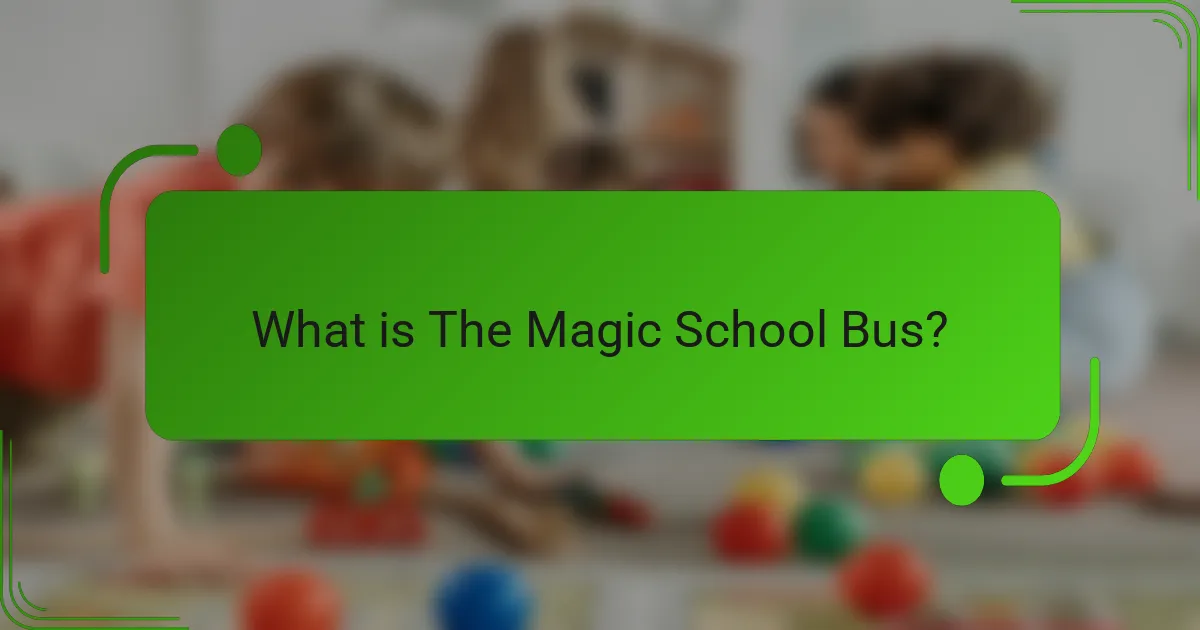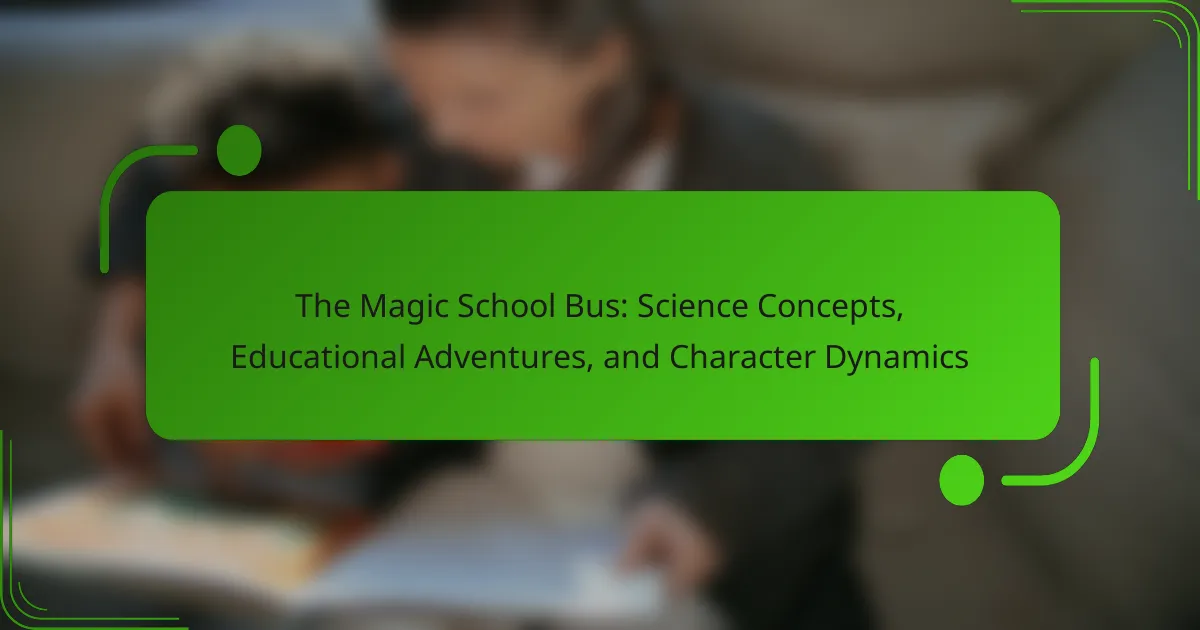The Magic School Bus is an educational animated television series that follows Ms. Frizzle and her class on science-themed adventures. The show, which first aired in 1994, is based on a book series by Joanna Cole and Bruce Degen and aims to teach children about various scientific concepts through engaging field trips. Each episode features the bus transforming to explore topics such as biology, chemistry, and physics. The series has received critical acclaim and numerous awards for its ability to combine entertainment with educational content, making science accessible and enjoyable for young viewers. Key themes include the exploration of science concepts, the dynamics between characters, and the overall educational value of the series.

What is The Magic School Bus?
The Magic School Bus is an educational animated television series. It follows Ms. Frizzle and her class on science-themed adventures. The series aims to teach children about various scientific concepts. Each episode features a field trip where the bus transforms to explore topics like biology, chemistry, and physics. The show first aired in 1994 and was based on a book series by Joanna Cole and Bruce Degen. It combines entertainment with educational content to engage young viewers. The Magic School Bus has received critical acclaim and numerous awards for its educational value.
How does The Magic School Bus engage with science concepts?
The Magic School Bus engages with science concepts through interactive storytelling and hands-on learning. Each episode features Ms. Frizzle leading her students on educational field trips. These adventures explore various scientific topics, such as biology, physics, and environmental science. The show incorporates real scientific principles into its narrative. For example, episodes demonstrate concepts like ecosystems and the water cycle. The characters experience phenomena firsthand, making science relatable and fun. The series emphasizes inquiry-based learning, encouraging curiosity and exploration. This approach aligns with educational standards in science education.
What are the key science concepts explored in The Magic School Bus?
The key science concepts explored in The Magic School Bus include biology, chemistry, physics, and earth science. The series addresses topics such as ecosystems, the human body, chemical reactions, and energy. Each episode features Ms. Frizzle guiding students on educational field trips. These trips often involve hands-on experiments and immersive learning experiences. The show emphasizes scientific inquiry and critical thinking. For example, episodes on the human body explore anatomy and physiology. Chemistry episodes demonstrate concepts like states of matter and reactions. Physics episodes illustrate principles such as force and motion. Earth science episodes cover weather patterns and geological processes.
How do the episodes illustrate these science concepts?
The episodes illustrate science concepts through engaging narratives and interactive learning experiences. Each episode focuses on a specific scientific principle, such as ecosystems or the human body. Characters embark on adventures that demonstrate these concepts in action. For instance, in the episode about ecosystems, students explore a rainforest and learn about biodiversity. The show’s use of animation visually represents scientific processes, making them accessible to young viewers. Additionally, the characters’ problem-solving strategies highlight the scientific method. This approach reinforces the idea that science is a dynamic and exploratory field. Through these methods, the episodes effectively teach foundational science concepts in an entertaining way.
What educational adventures does The Magic School Bus offer?
The Magic School Bus offers a variety of educational adventures centered around science concepts. Each episode features Ms. Frizzle and her class embarking on a journey that teaches specific scientific principles. These adventures include exploring the human body, traveling through space, and studying ecosystems. The show uses imaginative storytelling to explain complex topics in an engaging way. For example, in one episode, the class shrinks to explore the inner workings of a cell. This hands-on approach helps students grasp difficult concepts through visual and experiential learning. The show’s blend of entertainment and education has made it a valuable resource for teaching science.
How do the adventures enhance learning experiences?
Adventures enhance learning experiences by providing immersive, hands-on engagement with scientific concepts. They allow students to explore complex topics in a relatable context. For example, in “The Magic School Bus,” characters embark on journeys that illustrate principles like ecosystems or the human body. This active participation promotes better retention of information. Studies show that experiential learning increases understanding and interest in subjects. Engaging narratives also spark curiosity, encouraging students to ask questions and seek answers. Overall, these adventures create a dynamic learning environment that fosters critical thinking and creativity.
What themes are commonly explored in the adventures?
Common themes explored in the adventures of “The Magic School Bus” include curiosity, teamwork, and scientific discovery. Curiosity drives the characters to explore new scientific concepts. Teamwork is essential as they work together to solve problems during their journeys. Scientific discovery is highlighted through hands-on experiments and learning experiences. Each episode emphasizes the importance of asking questions and seeking knowledge. The adventures often showcase real-world applications of science. Characters face challenges that require critical thinking and collaboration. These themes encourage a love for learning and exploration in young viewers.
Who are the main characters in The Magic School Bus?
The main characters in The Magic School Bus are Ms. Frizzle, Arnold, Phoebe, Carlos, Wanda, Tim, and Dorothy Ann. Ms. Frizzle is the enthusiastic teacher who leads the class on adventures. Arnold is known for his cautious nature and often expresses concern during trips. Phoebe is the supportive friend who values friendship. Carlos is the class clown and loves to joke around. Wanda is practical and often offers solutions. Tim is curious and enjoys exploring new concepts. Dorothy Ann is knowledgeable and often shares facts during adventures. These characters contribute to the educational themes of the series.
What roles do the characters play in the educational journey?
In “The Magic School Bus,” characters serve specific roles that enhance the educational journey. The teacher, Ms. Frizzle, is the primary guide, facilitating exploration and discovery. She encourages curiosity and critical thinking among students. Each student represents diverse perspectives and skills, contributing to group problem-solving. For instance, Arnold often embodies the cautious voice, while Phoebe promotes environmental awareness. The characters’ interactions illustrate teamwork and collaboration, essential for learning. Their adventures provide practical applications of scientific concepts, making lessons more engaging and relatable. This dynamic enriches the educational experience, fostering a deeper understanding of various subjects.
How do character dynamics contribute to the storylines?
Character dynamics are essential in shaping storylines. They create conflict and resolution, driving the narrative forward. In “The Magic School Bus,” interactions among characters highlight their individual traits. For instance, Ms. Frizzle’s adventurous spirit contrasts with Arnold’s cautious nature. This contrast generates tension and humor, enriching the plot. Additionally, character relationships evolve, reflecting lessons learned during adventures. The group’s teamwork fosters collaboration, crucial for problem-solving in each episode. Overall, character dynamics enhance engagement and educational value, making the storylines more compelling.
How does The Magic School Bus promote science education?
The Magic School Bus promotes science education by integrating engaging narratives with scientific concepts. Each episode features Ms. Frizzle leading students on adventures that explore various scientific principles. The show simplifies complex ideas, making them accessible for children. It covers topics like ecosystems, the human body, and physics through interactive storytelling. Visual animations illustrate scientific phenomena, enhancing understanding. The series encourages curiosity and critical thinking by posing questions and challenges. Research indicates that educational shows like this can improve science literacy in young viewers. The Magic School Bus has received praise for its effectiveness in teaching science through entertainment.
What are some unique features of The Magic School Bus series?
The Magic School Bus series features a unique blend of educational content and engaging storytelling. It uses a magical school bus that transforms to explore scientific concepts. Each episode focuses on a specific scientific topic, such as ecosystems or the human body. The characters, led by Ms. Frizzle, encourage curiosity and hands-on learning. The series combines animation with real-life science, making complex ideas accessible. It promotes teamwork, problem-solving, and critical thinking among students. The show’s interactive elements, like quizzes and experiments, enhance viewer engagement. Overall, it effectively balances entertainment and education, making learning fun and memorable.
What are the key takeaways from The Magic School Bus?
The key takeaways from The Magic School Bus include educational engagement, exploration of scientific concepts, and teamwork. The series effectively combines entertainment with learning. Each episode introduces a new scientific theme, such as ecosystems or the human body. Students embark on adventures that promote curiosity and critical thinking. Characters, like Ms. Frizzle, model enthusiasm for science. The show’s format encourages active participation from viewers. Overall, it fosters a love for learning and discovery in young audiences.
How can educators use The Magic School Bus in the classroom?
Educators can use The Magic School Bus in the classroom as an engaging tool for teaching science concepts. The series presents complex topics in a fun and relatable manner. Each episode explores specific scientific principles through adventurous storytelling. Educators can incorporate episodes into lesson plans to illustrate topics like ecosystems, human anatomy, or physics. This multimedia approach caters to various learning styles, making science accessible to all students. Additionally, educators can facilitate discussions post-viewing to reinforce key concepts. Activities can be designed around episodes to encourage hands-on learning. Research shows that using multimedia resources enhances student engagement and retention of information.
What lessons can children learn from The Magic School Bus?
Children can learn various lessons from The Magic School Bus. The series emphasizes the importance of curiosity and exploration. It encourages children to ask questions and seek answers through scientific inquiry. Each episode introduces specific scientific concepts, making learning engaging and relatable. Children gain insights into biology, physics, and environmental science through fun adventures. The show also highlights teamwork and collaboration among classmates. Characters demonstrate problem-solving skills and critical thinking. Overall, The Magic School Bus fosters a love for learning and science in children.
The Magic School Bus is an educational animated television series that follows Ms. Frizzle and her class as they embark on science-themed adventures to teach children various scientific concepts. The series, which first aired in 1994, combines interactive storytelling with hands-on learning, covering topics such as biology, chemistry, and physics. Key characters like Ms. Frizzle and her students play specific roles that enhance the educational journey, emphasizing themes of curiosity, teamwork, and scientific discovery. The show effectively promotes science education through engaging narratives and visual animations, making complex ideas accessible and enjoyable for young viewers.
